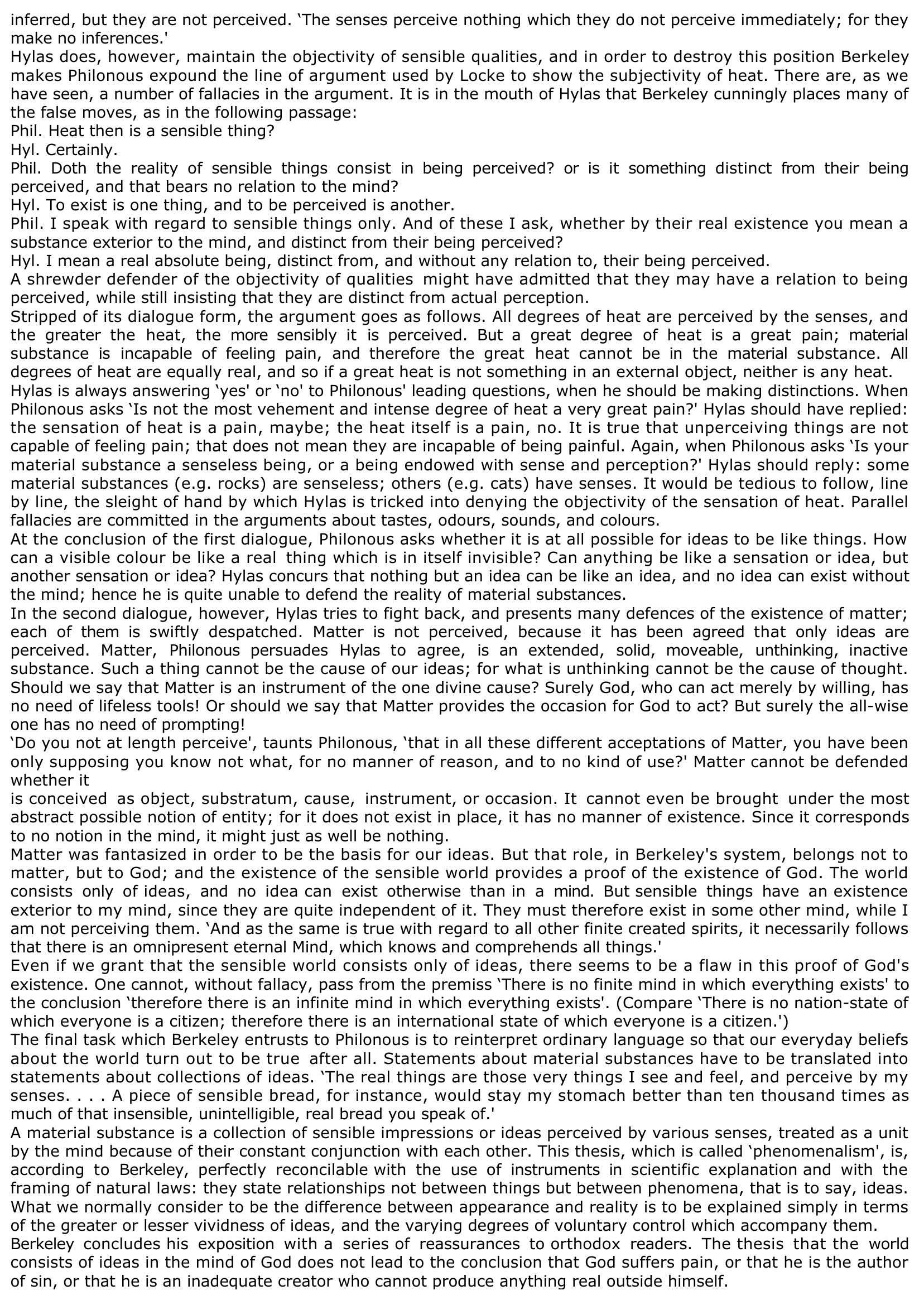Encyclopedia of Philosophy: Berkeley
Publié le 09/01/2010
Extrait du document

In 1715 King Louis XIV of France died. A year earlier Queen Anne, the last of the Stuart monarchs of England, had died, and on her death, the English crown was given to the dynasty of Hanover, in order to preserve the Protestant succession. The Hanoverian King Georges were able to maintain their throne against attempts by the son and grandson of James II (the ‘Old and Young Pretenders') to restore the Stuart line. At the beginning of the eighteenth century, in the reign of Anne, the crowns of England and Scotland were united; and those of England and Ireland were united at the end of the century, in the reign of George III. Thus was formed the United Kingdom of Great Britain and Ireland. As it turned out, the ablest philosophers writing in English in the eighteenth century were Irish or Scottish, though all of them saw themselves as carrying on the tradition of the Englishman John Locke.

«
inferred, but they are not perceived.
‘The senses perceive nothing which they do not perceive immediately; for theymake no inferences.'Hylas does, however, maintain the objectivity of sensible qualities, and in order to destroy this position Berkeleymakes Philonous expound the line of argument used by Locke to show the subjectivity of heat.
There are, as wehave seen, a number of fallacies in the argument.
It is in the mouth of Hylas that Berkeley cunningly places many ofthe false moves, as in the following passage:Phil.
Heat then is a sensible thing?Hyl.
Certainly.Phil.
Doth the reality of sensible things consist in being perceived? or is it something distinct from their beingperceived, and that bears no relation to the mind?Hyl.
To exist is one thing, and to be perceived is another.Phil.
I speak with regard to sensible things only.
And of these I ask, whether by their real existence you mean asubstance exterior to the mind, and distinct from their being perceived?Hyl.
I mean a real absolute being, distinct from, and without any relation to, their being perceived.A shrewder defender of the objectivity of qualities might have admitted that they may have a relation to beingperceived, while still insisting that they are distinct from actual perception.Stripped of its dialogue form, the argument goes as follows.
All degrees of heat are perceived by the senses, andthe greater the heat, the more sensibly it is perceived.
But a great degree of heat is a great pain; materialsubstance is incapable of feeling pain, and therefore the great heat cannot be in the material substance.
Alldegrees of heat are equally real, and so if a great heat is not something in an external object, neither is any heat.Hylas is always answering ‘yes' or ‘no' to Philonous' leading questions, when he should be making distinctions.
WhenPhilonous asks ‘Is not the most vehement and intense degree of heat a very great pain?' Hylas should have replied:the sensation of heat is a pain, maybe; the heat itself is a pain, no.
It is true that unperceiving things are notcapable of feeling pain; that does not mean they are incapable of being painful.
Again, when Philonous asks ‘Is yourmaterial substance a senseless being, or a being endowed with sense and perception?' Hylas should reply: somematerial substances (e.g.
rocks) are senseless; others (e.g.
cats) have senses.
It would be tedious to follow, lineby line, the sleight of hand by which Hylas is tricked into denying the objectivity of the sensation of heat.
Parallelfallacies are committed in the arguments about tastes, odours, sounds, and colours.At the conclusion of the first dialogue, Philonous asks whether it is at all possible for ideas to be like things.
Howcan a visible colour be like a real thing which is in itself invisible? Can anything be like a sensation or idea, butanother sensation or idea? Hylas concurs that nothing but an idea can be like an idea, and no idea can exist withoutthe mind; hence he is quite unable to defend the reality of material substances.In the second dialogue, however, Hylas tries to fight back, and presents many defences of the existence of matter;each of them is swiftly despatched.
Matter is not perceived, because it has been agreed that only ideas areperceived.
Matter, Philonous persuades Hylas to agree, is an extended, solid, moveable, unthinking, inactivesubstance.
Such a thing cannot be the cause of our ideas; for what is unthinking cannot be the cause of thought.Should we say that Matter is an instrument of the one divine cause? Surely God, who can act merely by willing, hasno need of lifeless tools! Or should we say that Matter provides the occasion for God to act? But surely the all-wiseone has no need of prompting!‘Do you not at length perceive', taunts Philonous, ‘that in all these different acceptations of Matter, you have beenonly supposing you know not what, for no manner of reason, and to no kind of use?' Matter cannot be defendedwhether itis conceived as object, substratum, cause, instrument, or occasion.
It cannot even be brought under the mostabstract possible notion of entity; for it does not exist in place, it has no manner of existence.
Since it correspondsto no notion in the mind, it might just as well be nothing.Matter was fantasized in order to be the basis for our ideas.
But that role, in Berkeley's system, belongs not tomatter, but to God; and the existence of the sensible world provides a proof of the existence of God.
The worldconsists only of ideas, and no idea can exist otherwise than in a mind.
But sensible things have an existenceexterior to my mind, since they are quite independent of it.
They must therefore exist in some other mind, while Iam not perceiving them.
‘And as the same is true with regard to all other finite created spirits, it necessarily followsthat there is an omnipresent eternal Mind, which knows and comprehends all things.'Even if we grant that the sensible world consists only of ideas, there seems to be a flaw in this proof of God'sexistence.
One cannot, without fallacy, pass from the premiss ‘There is no finite mind in which everything exists' tothe conclusion ‘therefore there is an infinite mind in which everything exists'.
(Compare ‘There is no nation-state ofwhich everyone is a citizen; therefore there is an international state of which everyone is a citizen.')The final task which Berkeley entrusts to Philonous is to reinterpret ordinary language so that our everyday beliefsabout the world turn out to be true after all.
Statements about material substances have to be translated intostatements about collections of ideas.
‘The real things are those very things I see and feel, and perceive by mysenses.
.
.
.
A piece of sensible bread, for instance, would stay my stomach better than ten thousand times asmuch of that insensible, unintelligible, real bread you speak of.'A material substance is a collection of sensible impressions or ideas perceived by various senses, treated as a unitby the mind because of their constant conjunction with each other.
This thesis, which is called ‘phenomenalism', is,according to Berkeley, perfectly reconcilable with the use of instruments in scientific explanation and with theframing of natural laws: they state relationships not between things but between phenomena, that is to say, ideas.What we normally consider to be the difference between appearance and reality is to be explained simply in termsof the greater or lesser vividness of ideas, and the varying degrees of voluntary control which accompany them.Berkeley concludes his exposition with a series of reassurances to orthodox readers.
The thesis that the worldconsists of ideas in the mind of God does not lead to the conclusion that God suffers pain, or that he is the authorof sin, or that he is an inadequate creator who cannot produce anything real outside himself..
»
↓↓↓ APERÇU DU DOCUMENT ↓↓↓
Liens utiles
- Encyclopedia of Philosophy: al-Ghazali, Abu Hamid
- Encyclopedia of Philosophy: al-Farabi, Abu Nasr
- Encyclopedia of Philosophy: Alexander, Samuel
- Encyclopedia of Philosophy: Alexander of Hales
- Encyclopedia of Philosophy: Alexander of Aphrodisias


